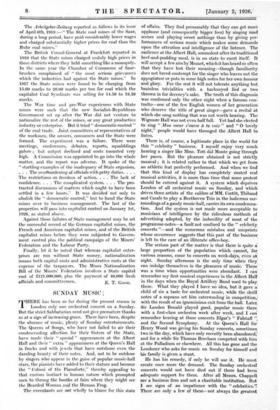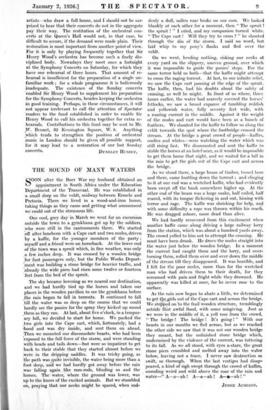SUNDAY MUSIC J
mHERE has been so far during the present season in London only one orchestral concert on a Sunday. But the strict Sabbatarian need not give premature thanks as at a -sign of increasing-grace. There have been, despite the absence of music, -plenty of Sunday entertainments. The Queens of Songs, who have not failed to air their condescending affection for their Sisters of the State, have made their " special " appearances at the Albert Hall and their " extra " appearances at the Queen's Hall in frocks and with jewels that have outshone even the dazzling beauty of their notes. And, not to be outdone by singers who appear in the guise of popular music-hall stars, the pianists have added to their stature and become the "Colossi of the Pianoforte," thereby appealing to that curious instinct in human nature which prompted men to throng the booths at fairs where they might see- the Bearded Woman and the Human Frog.
The execulants are net wholly to blame for this state of affairs. They find presumably that they can get more applause (and consequently bigger fees) by singing mad scenes and playing sweet nothings than by giving per- formances of serious music which makes some demands upon the attention and intelligence of the listener. The audience at the Albert Hall, somnolent after its traditional beef-and-pudding meal, is in no state to exert itself. It will accept a few airs by Mozart, which it has heard se often that they have lost their meaning—though familiarity does not breed contempt for the singer who leaves' out the appogiature or puts in some high notes for her own honour and glory. For the rest it will not tolerate anything but brainless trivialities with a hackneyed lied or two thrown in for decency's sake. The truth of this diagnosis was confirmed only the other night when a famous con- tralto—one of the few English women of her generation who deserve the title of great singer—gave a recital at which she sang nothing that was not worth hearing. The VVigmore Hall was not even half full. Yet had she elected to sing "Mon coeur s'ouvre a ta voix " and "0 lovely night," people would have thronged the' Albert Hall to listen; There is, of course, a legitimate place in the world for this " celebrity " business. I myself enjoy very much hearing a singer like Mme. Toti dal Monte going through her paces. But the pleasure obtained is not strictly, musical ; it is related rather to that which we get from an athletic feat perfectly performed. And when we find that this kind of display has completely ousted real musical activities, it is more than time that some protest should be entered against it. A system which deprives London of all orchestral music on Sunday, and which drives three artists of the calibre of MM. Cort6t, Thibaud and Casals to play a Beethoven Trio in the ludicrous sur- roundings of a gaudy music-hall, carries its own condemna- tion. And the system is not made more acceptable to musicians of intelligence by the ridiculous methods of advertising adopted, by the imbecility of most of the programme-notes—a fault not confined to the" celebrity, concerts "—and the numerous' mistakes and misprints whose occurrence suggests that this part of the business is left to the care of an illiterate office-boy.
The serious part of the matter is that there is quite large proportion of the population which cannot, for, various reasons, come to concerts on week-days,- even als,' night. Sunday afternoon is the only time when they, can indulge themselves in the pleasures of music. There was a time when opportunities were abundant. I can remember my first musical experiences' in the Albert Half in the days when the Royal Artillery Band used to play, there. What they played I have no idea, but it gave a) child of six a taste for orchestral music, while the shrill notes of a soprano set him caterwauling in competition,t with the result of an ignominious exit from the hall. Latex Sir Landon Ronald played good, popular music there with a first-class orchestra week after week, and I can remember hearing at those concerts Elgar's " Falstaff ", and the Second Symphony. At the Queen's Hall Sir Henry Wood was giving his Sunday concerts, sometimes two in the day, which have only recently been abandoned; and for a while Sir Thomas Beecham competed with him at the Palladium or elsewhere. All this has gone and the Londoner who asks for music on Sunday for himself and his family is given a stunt.
He has his remedy, if only he will use it. He must create once more the demand. The Sunday orchestral concerts would not have died out if there had been adequate support for them. After all Messrs. Chappell are a business firm and not a charitable institution. But I see signs of an impatience with the "celebrities." There are only a few of these—not always the greatest artists—who draw a full house, and I should not be sur- prised to hear that their concerts do not in the aggregate pay their way. The restitution of the orchestral con- certs at the Queen's Hall would not, in that case, be difficult to secure, if the demand were made plain. Their restoration is most important from another point of view. Vol* it is only by playing frequently together that Sir Henry Wood's orchestra has become such a finely dis- ciplined body. Nowadays they meet once a fortnight at the Symphony Concerts on Saturday, for which they have one rehearsal of three hours. That amount of re- hearsal is insufficient for the preparation of a single un- familiar work ; for a whole programme it is ludicrously inadequate. The existence of the Sunday concerts enabled Sir Henry .Wood to supplement his preparation for the Symphony Concerts, besides keeping the orchestra in good training. Perhaps, in these circumstances, it will not appear irrelevant to call the attention of Spectator 'readers to the fund established in order to enable Sir Henry Wood to call his orchestra together for extra re- hearsals. Contributions to this fund may be sent to Mr. W. Bennet, 82 Kensington Square, W. 8. Anything ;which tends to strengthen the position of orchestral ,music in London should be given all possible support, for it may lead to . a restoration of our lost Sunday











































 Previous page
Previous page